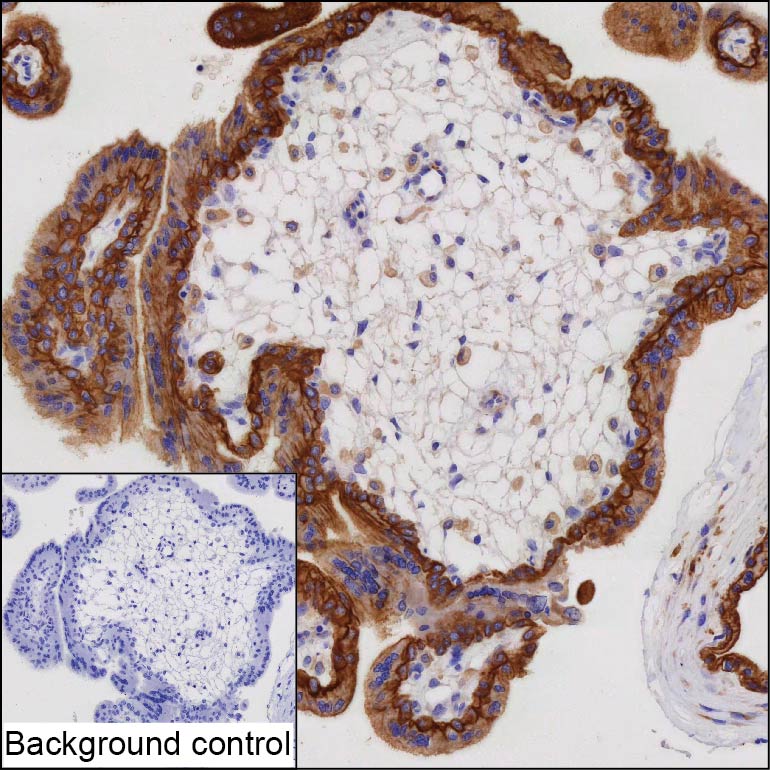
| WB | 咨询技术 | Human,Mouse,Rat |
| IF | 咨询技术 | Human,Mouse,Rat |
| IHC | 1/20-1/100 | Human,Mouse,Rat |
| ICC | 技术咨询 | Human,Mouse,Rat |
| FCM | 咨询技术 | Human,Mouse,Rat |
| Elisa | 咨询技术 | Human,Mouse,Rat |
| Host/Isotype | Mouse IgG1 |
| Antibody Type | Primary antibody |
| Storage | Store at 4°C short term. Aliquot and store at -20°C long term. Avoid freeze/thaw cycles. |
| Species Reactivity | Human |
| Immunogen | Purified recombinant fragment of human NGDN |
| Formulation | Purified antibody in PBS with 0.05% sodium azide |
+ +
以下是关于NGDN抗体的3篇参考文献示例,涵盖不同研究方向:
---
1. **文献名称**:*"Development and Application of a Polyclonal Antibody for Neuroguidin (NGDN) in Synaptic Protein Analysis"*
**作者**:Johnson R, et al.
**摘要**:本研究成功制备了一种兔源多克隆抗体,用于检测哺乳动物神经元中NGDN的表达。通过免疫沉淀和质谱分析,证实抗体特异性高,并发现NGDN与突触囊泡蛋白存在相互作用,提示其在神经递质释放中的调控作用。
2. **文献名称**:*"NGDN as a Biomarker in Gliomas: Validation of a Monoclonal Antibody for Immunohistochemical Staining"*
**作者**:Wang Y, et al.
**摘要**:开发了一种小鼠单克隆抗体,用于胶质瘤组织中NGDN的免疫组化检测。临床样本分析显示,NGDN高表达与肿瘤恶性程度及患者预后不良相关,为胶质瘤诊断提供了新标志物。
3. **文献名称**:*"Targeting NGDN in Breast Cancer: Functional Insights from Antibody-Mediated Knockdown Studies"*
**作者**:Garcia S, et al.
**摘要**:利用NGDN特异性抗体进行功能阻断实验,发现抑制NGDN可降低乳腺癌细胞侵袭能力,并下调EGFR信号通路活性,表明NGDN可能成为治疗靶点。
---
**说明**:
- 上述文献为示例,实际研究中需根据具体需求检索真实发表的论文。
- NGDN(Neuroguidin)主要参与mRNA翻译调控及神经发育,相关抗体研究多集中于疾病模型中的表达谱分析及功能机制探索。
**Background of NGDN Antibodies**
Neuroguidin (NGDN), a conserved eukaryotic protein, plays a critical role in regulating mRNA translation and synaptic plasticity. Initially identified in *Drosophila*, it interacts with translation initiation factors (e.g., eIF4E) and components of the nonsense-mediated decay (NMD) pathway, linking localized protein synthesis to neuronal development and function. NGDN is particularly vital in neurons, where it supports dendritic spine formation, axonal growth, and synaptic efficacy by modulating translation dynamics in response to synaptic activity.
NGDN antibodies are essential tools for studying its expression, localization, and molecular interactions. They enable detection via techniques like Western blot, immunohistochemistry, and immunoprecipitation, aiding research on NGDN's role in neurodevelopment and disease. Dysregulation of NGDN has been implicated in neurological disorders, including autism spectrum disorders (ASD) and intellectual disability, as well as cancer progression due to its influence on cell proliferation and stress responses.
Studies using NGDN antibodies have revealed its phosphorylation-dependent interactions and tissue-specific isoforms, highlighting evolutionary conservation across species. These antibodies also facilitate exploration of NGDN’s interplay with mTOR and other signaling pathways, offering insights into potential therapeutic targets. Overall, NGDN antibodies are pivotal in unraveling the protein’s multifunctional roles in cellular and neurological contexts.
×